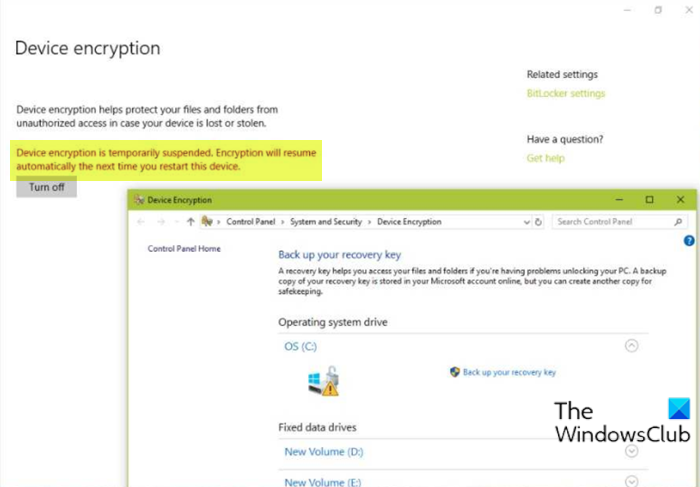The Device Encryption feature ships with both Windows Home and Pro editions; unlike the BitLocker feature that ships only with Pro edition. If you encounter the Device encryption is temporarily suspended error on your device, and even after multiple restarts it is not resumed, you can try the solutions in this post to resolve the issue.

When you encounter this issue, you’ll receive the following full error message;
Device encryption is temporarily suspended. Encryption will resume automatically the next time you restart this device.
What is Device encryption?
In a nutshell, Device encryption is the process whereby data is scrambled into illegible code and making it indecipherable to the unintended recipients of the data, without a password or a recovery key. The data is commonly referred to as ‘plaintext’, and is encoded using an encryption algorithm to turn it into an unreadable format commonly referred to as ‘ciphertext’.
What happens when encryption is suspended?
A suspended Device Encryption warning that you may get on your Windows PC simply means that the BitLocker protection has been suspended on your device. In this case the drive is still encrypted but the protection is off, for example, no TPM PIN or Password is required when you start the OS. You can resume or suspend BitLocker Protection for Drives on your Windows computer.
Fix Device encryption is temporarily suspended error
If you’re faced with this Device encryption is temporarily suspended error on your Windows 11 or Windows 10 computer, you can follow the instructions outlined below to resolve the issue.
Do the following:
- Press Windows key + R to invoke the Run dialog.
- In the Run dialog box, type
tpm.mscand hit Enter to open TPM Management snap-in. - In the right pane, under Actions, click on Clear TPM.
- Exit TPM Management snap-in.
- Restart PC.
Once the computer successfully boots to the desktop, continue as follows:
- Press Windows key + X to open Power User Menu.
- Tap A on the keyboard to launch PowerShell in admin/elevated mode.
- In the PowerShell console, type in the command below and hit Enter.
manage-bde -status
The command will output key protectors as None Found.
- Now, type or copy and paste the command below and hit Enter to add TPM as key protector to the OS drive. If C: drive is not your OS drive letter, replace it accordingly.
Add-BitLockerKeyProtector -MountPoint "C:" -TpmProtector
Once the command executes successfully, the issue should be resolved. You can now run the manage-bde -status command to check the drive encryption status.
How do you resume BitLocker encryption paused?
To resume BitLocker encryption paused, follow these instructions; open command prompt in admin mode.
In the CMD prompt, type manage-bde -protectors -disable C: and hit Enter.
Once the command executes successfully, you can then start the encryption process by running the command manage-bde -resume C:.
Can I interrupt BitLocker encryption?
Essentially, you will be unable to cancel the BitLocker encryption process, as it is an inbuilt feature. However, you can suspend or resume the encryption – open BitLocker Drive Encryption by clicking the Start button > Control Panel > Security > BitLocker Drive Encryption.
Leave a Reply